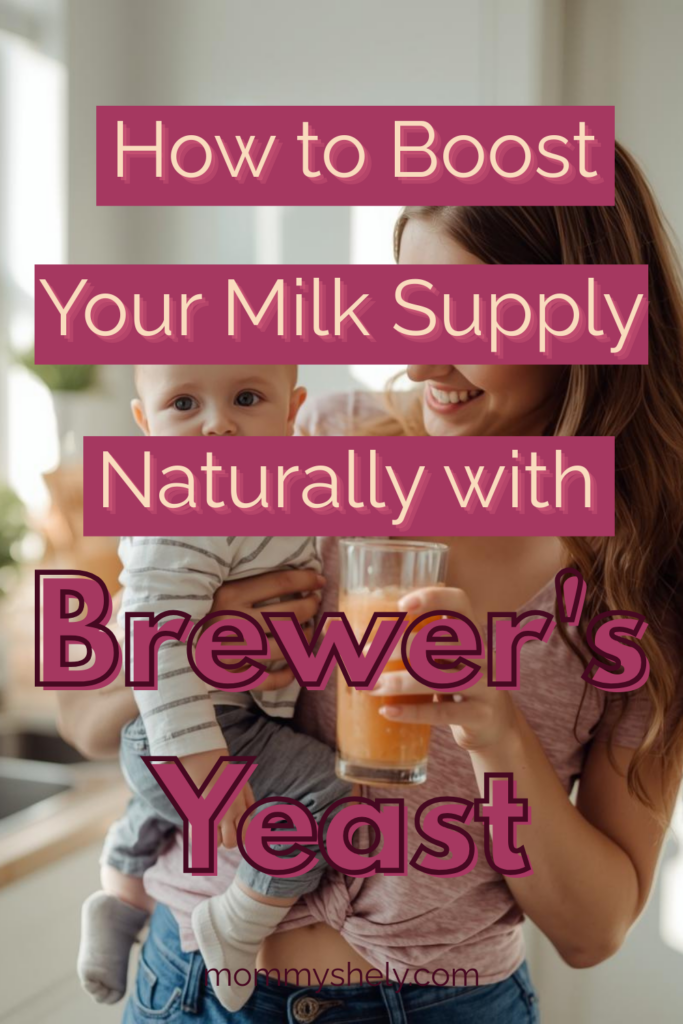Wondering how much brewers yeast to take for increasing your milk supply? You’re in the right place. Brewers yeast is one of the most popular natural supplements for breastfeeding mothers looking to boost their breast milk production.
When I started taking brewers yeast (with my second baby), I noticed a real difference within about 5 days. My pumping output increased, and my breasts felt fuller between feedings. Combined with regular nursing, it helped me build the supply I needed to keep up with my baby’s demands.
In this complete guide, I’ll cover everything you need to know: the right dosage, proven benefits, safety information, and easy ways to add brewers yeast to your daily routine, including delicious recipes that actually work.
Pin For Later!

As an Amazon Associate I earn from qualifying purchases. This post may contain affiliate links.
What is Brewer’s Yeast?
Brewer’s yeast is a type of… well, yeast. That is a byproduct of brewing beer. But don’t worry, the brewers yeast you buy as a supplement contains no alcohol and won’t make you or your baby drowsy!
It’s packed with essential nutrients, including B vitamins, protein, and minerals like chromium and selenium.
While it’s commonly used in beer and bread, it’s also widely available as a dietary supplement, especially beneficial for lactation.
Many breastfeeding mothers take Brewer’s Yeast for lactation because it is believed to help with milk production and overall postpartum health.
How Much Brewers Yeast to Increase Milk Supply
This is the #1 question most breastfeeding moms ask, and the answer depends on your individual needs and how you’re taking it.
Recommended Dosage Guidelines
For Brewers Yeast Powder:
- Starting dose: 1 tablespoon (about 10g) per day
- Standard dose: 2-3 tablespoons (20-30g) per day
- Maximum dose: Up to 4 tablespoons (40g) per day
For Brewers Yeast Tablets/Capsules:
- Starting dose: 3-4 tablets (500mg each) per day
- Standard dose: 6-8 tablets per day
- Follow package directions as concentrations vary by brand
How to Start Taking Brewers Yeast
Week 1: Start with 1 tablespoon of powder (or 3-4 tablets) daily to assess tolerance. Mix into your morning smoothie or oatmeal.
Week 2: If you’re tolerating it well with no digestive issues, increase to 2 tablespoons (or 6 tablets) daily.
Week 3+: Increase to 3 tablespoons (or 8 tablets) if needed for optimal results.
Important Dosage Tips
- Take it consistently – Daily use is key for seeing results
- Split your dose – Take half in the morning, half in the afternoon
- Take with food – Reduces chance of stomach upset
- Stay hydrated – Drink plenty of water throughout the day
- Be patient – It may take 3-7 days to notice changes
Most lactation consultants recommend working up to 3 tablespoons per day for optimal milk supply support. This is the amount used in many lactation cookie recipes and what most moms find effective.
How Brewers Yeast Works for Milk Production
You might be wondering: How does brewers yeast actually help with breastfeeding?
While the exact mechanism isn’t fully understood, researchers believe brewers yeast supports lactation through several pathways:
1. Nutrient Density Supports Milk Production
Breast milk production requires significant nutritional resources. The B vitamins, iron, and protein in brewers yeast help replenish nutrients depleted during breastfeeding, supporting your body’s ability to make milk.
2. B Vitamins Boost Energy
Fatigue is one of the biggest challenges for new moms. The B-complex vitamins in brewers yeast help convert food into energy, giving you the stamina needed for frequent nursing sessions and milk production.
3. Chromium Stabilizes Blood Sugar
Stable blood sugar levels are important for consistent milk supply. Chromium in brewers yeast helps regulate glucose, preventing energy crashes that can impact milk production.
4. May Support Prolactin Levels
Some studies suggest B vitamins and chromium may help support healthy prolactin levels, the hormone responsible for milk production.
The Bottom Line: While brewers yeast isn’t a magic cure, many breastfeeding mothers (like me) report increased milk supply when using it consistently alongside regular nursing or pumping.
Benefits of Brewers Yeast for Breastfeeding Moms
Research suggests that the B vitamins, protein, and iron in Brewer’s Yeast can help:
- Increase milk supply naturally – The primary reason most moms take brewers yeast. Many nursing mothers report noticeable increases in milk production within 3-7 days of consistent use.
- Boost energy levels in tired moms – The B vitamins in brewers yeast help combat postpartum fatigue by supporting energy metabolism, helping you keep up with demanding feeding schedules.
- Prevent postpartum anemia – Rich in iron and B vitamins, brewers yeast helps replenish nutrients lost during childbirth and supports healthy red blood cell production, preventing the fatigue associated with anemia.
- Support a healthy immune system – The beta-glucans and minerals in brewers yeast support your immune system during a time when you’re sleep-deprived and more susceptible to illness.
- Improve mood and reduce stress – Some mothers report improved mood and reduced symptoms of postpartum blues when taking brewers yeast regularly.
- Improve skin and hair health – The biotin and other B vitamins support healthy skin and hair during the postpartum period when hormonal changes can affect your appearance.
For breastfeeding moms, maintaining optimal nutrition is crucial for both your own health and the health of your baby.
How to Take Brewers Yeast: Powder, Tablets, or Capsules
The recommended dosage of Brewer’s Yeast for lactation varies, but most experts suggest starting with 1-2 tablespoons per day and gradually increasing to 3 tablespoons per day.
Brewers yeast comes in several forms, each with advantages and disadvantages. Here’s how to choose what’s right for you:
Brewers Yeast Powder
Best for: Moms who don’t mind the taste or want to add it to recipes
Pros:
- Most cost-effective option
- Easy to add to smoothies, oatmeal, and baked goods
- Flexible dosing
- Higher concentration per serving
Cons:
- Bitter, nutty taste that some find unpleasant
- Requires measuring
- Can be messy
How to use: Start with 1 tablespoon mixed into smoothies, yogurt, oatmeal, or lactation cookie recipes. Gradually increase to 3 tablespoons daily.
Recommended products:
- Legendairy Milk – Unflavored, pure powder
- Mommy Knows Best – High-quality, affordable option
Brewers Yeast Tablets
Best for: Moms who want convenience without the taste
Pros:
- No taste
- Portable and convenient
- Pre-measured doses
- Easy to swallow
Cons:
- More expensive per serving
- Need to take multiple tablets daily
- Can’t add to recipes
- Takes longer to absorb
How to use: Take 6-8 tablets daily with meals, split into 2-3 doses.
Recommended product:
- Brewers Yeast Tablets – 1,500mg each
Brewers Yeast Capsules
Best for: Moms who want maximum convenience
Pros:
- Same benefits as tablets
- Often easier to swallow than tablets
- No taste
Cons:
- Most expensive option
- Same limitations as tablets
My recommendation: If you enjoy baking or making smoothies, go with powder for the best value and flexibility. If you’re not the cooking type, tablets or capsules are worth the extra cost for convenience.
Easy Brewers Yeast Recipes for Lactation
Looking for some delicious recipes to incorporate brewer’s yeast into your diet?
Here are a few ideas to get you started:
- Brewer’s Yeast Lactation Cookies: Check out this recipe from Fit Mitten Kitchen .These tasty cookies are not only delicious but also packed with nutrients to support breastfeeding.
- Brewer’s Yeast Banana Smoothie: Blend together a ripe banana, a cup of almond milk, a handful of spinach, a scoop of protein powder, and a tablespoon of brewer’s yeast for a nutritious and energizing smoothie.
- Brewer’s Yeast Energy Bites: Mix together oats, peanut butter, honey, chocolate chips, and brewer’s yeast, then roll into bite-sized balls for a convenient and tasty snack on the go.
The recommended dosage by most healthcare professionals is three tablespoons per day.
Also checkout: Delicious Lactation Recipes to Boost Your Milk Supply
If you’re not the baking type, there are several prepared baked goods already containing Brewer’s Yeast, specifically formulated for lactation. You can Try MilkBliss Cookies or Munchkin Milkmakers Cookie Bites.

How Long Does it Take Brewer’s Yeast to Increase Milk Supply?
The time it takes for brewer’s yeast to increase milk supply can vary from mom to mom.
Some breastfeeding moms may notice an increase in milk production within a few days, while others may take longer to see results.
Consistency is key, so it’s essential to consume brewer’s yeast regularly to maximize its potential benefits.
Is Brewer’s Yeast Safe for Breastfeeding Moms and Babies?
Yes, in general, brewer’s yeast is considered safe for breastfeeding moms and their babies.
However, as with any supplement, it’s essential to use caution and consult with a healthcare professional before adding it to your routine, especially if you have any underlying health conditions or concerns.
While rare, some individuals may be allergic to brewer’s yeast.
If you experience any adverse reactions after taking brewer’s yeast, such as hives or difficulty breathing, stop using it immediately and seek medical attention.
When Not to Use Brewer’s Yeast
While brewers yeast is safe for most breastfeeding mothers, there are specific situations where you should avoid it or use it with extreme caution:
- Allergies: If you have a known allergy to yeast or brewer’s yeast, it’s best to avoid using it altogether to prevent an allergic reaction.
- Digestive Sensitivities: If you have a history of digestive issues or sensitivities, you may want to avoid brewer’s yeast or use it with caution, as it can exacerbate symptoms.
- Medication Interactions: If you’re taking any medications or supplements, consult with your healthcare provider before using brewer’s yeast, as it may interact with certain medications.
- Diabetes: If you’re diabetic, it’s important to be cautious when using brewer’s yeast, as it can stabilize blood sugar levels and potentially lower them too much, leading to hypoglycemia.
- Weakened Immune System: If you have a weakened immune system, it may increase the risk of blood infections.
Should YOU Use Brewer’s Yeast?
Well, as a breastfeeding mom myself, I’ve personally experienced the benefits of brewers yeast, and I genuinely believe it can be a helpful addition to your lactation routine when used correctly.
When Emily was about 6 weeks old, I noticed my milk supply wasn’t keeping up with her growing appetite, especially in the evenings. I was stressed, exhausted, and worried about having enough milk. That’s when I decided to try brewers yeast.
I learnt that brewers yeast wasn’t a magic solution on its own. The real game-changer was combining it with the fundamentals: frequent nursing on demand, staying hydrated, eating enough calories, and getting as much rest as possible (easier said than done, I know!).
For more tips and advices about breastfeeding, check out my Ultimate Guide to Succesfull Breastfeeding.
If you’re thinking about trying it out, starting with a small dosage, monitoring for any side effects, and gradually increasing your intake is the recommended approach.
So, are you considering adding Brewer’s yeast to your diet? Let me know in the comments below!
With love,
Shely



